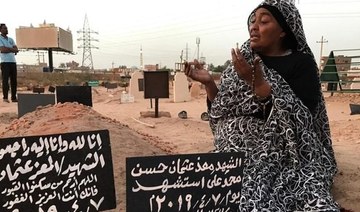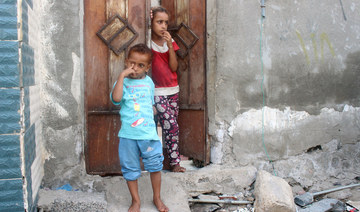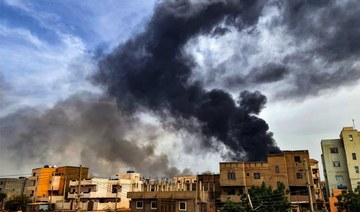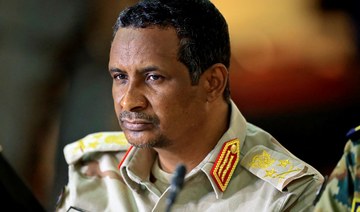KHARTOUM, Sudan: A transition agreement between Sudan’s ruling military council and a pro-democracy coalition was scheduled to be signed Saturday, a top African Union diplomat said, just hours after the military claimed it thwarted an attempted coup by a group of officers.
The AU’s Mohammed el-Hassan Labat made the announcement Friday. The transition agreement sets up a joint Sovereign Council that will rule for a little over three years while elections are organized.
Ethiopian mediator Mahmoud Dirir, who has been involved in mediating between the two sides, told reporters that the political declaration will be “debated on, discussed and signed at the same time.”
The deal is meant to break the political deadlock that has gripped the country following the overthrow of autocratic President Omar Al-Bashir in April.
Lt. Gen. Gamal Omar, a member of Sudan’s military council, said the coup attempt took place late Thursday, just days after the military and the pro-democracy coalition had agreed to the joint sovereign council.
In a statement, Omar said at least 16 active and retired military officers were arrested. Security forces were pursuing the group’s leader and additional officers who took part in plotting the coup attempt, he said, but the council did not reveal the name of the attempted leader, his rank or other details.
“The attempted coup came in a critical time, ahead of the deal with the Forces for the Declaration of Freedom and Change,” Omar said, referring to the coalition of political groups that speaks for the pro-democracy demonstrators.
Earlier this week, Gen. Abdel-Fattah Burhan told the pan-Arab Asharq Al-Awsat newspaper that the ruling military council has thwarted several military coup attempts and that investigations were underway to determine who were behind them.
Tarek Abdel Meguid, an FDFC leader, voiced skepticism about the military’s announcement of a failed coup, calling it a hoax meant to pressure pro-democracy forces into signing the deal.
“They want to say that the situation in Sudan is very volatile, and that there is a deep state with people capable of staging a military coup, so we should hurry up and sign and leave any points of difference to be discussed later,” Abdel Meguid told the Associated Press.
Last week, the military and FDFC representatives announced that they had reached a power-sharing agreement amid robust African and international pressure.
A military leader is to head the council for the first 21 months, followed by a civilian leader for the next 18. They also agreed on an independent Sudanese investigation into the deadly crackdown by security forces on the protests last month — though it’s unclear if anyone will be held accountable. The military also agreed to restore the Internet after a weekslong blackout.
The political transition deal is meant to end the impasse between the military council and the protest movement since security forces razed a massive pro-democracy sit-in in Khartoum early last month, killing more than 100 people, according to protest organizers. A committee of legal experts was assigned to draft the details before it would be handed over for both parties to sign.
The signing ceremony was expected to take place earlier this week, but several delays were announced, raising suspicions the two parties might still be divided over the agreement’s details. Several pro-democracy activists and party leaders had said the transitional military council was seeking to alter some of the language to increase the mandate of the generals during the transitional period.
Rasha Awad, editor of the online Sudanese newspaper Altaghyeer, said the military council’s actions will determine what happens next.
“I believe that the FDFC had already made a lot of concessions in this deal, but it seems that the military still expects more from them. If the military insists on that, the signing will be delayed further,” she said.
Awad also concurred that the announcement of a failed coup might be a ruse to use against the pro-democracy movement. But she did not rule out the possibility that the remnants of Bashir’s regime within the state might be plotting a comeback through a military coup.
“Counterrevolutionary forces represented in the old Islamist regime are very active now,” she said.
AU envoy: Sudan military, protesters to sign political deal
AU envoy: Sudan military, protesters to sign political deal
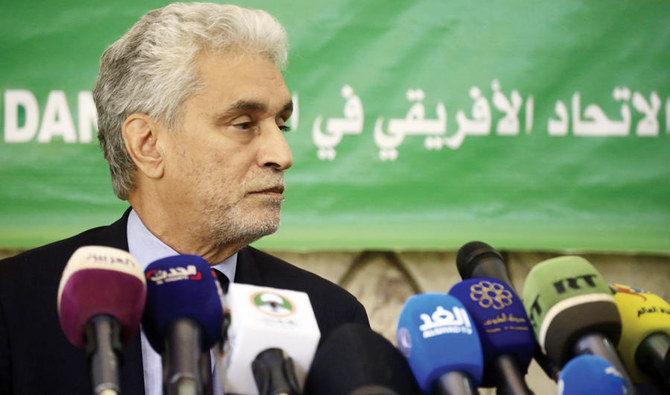
- A military leader is to head the council for the first 21 months, followed by a civilian leader for the next 18
- Ethiopian mediator Mahmoud Dirir has been involved in mediating between the two sides
Leaders of Jordan and Pakistan call UAE president to express concern about effects of severe storm

- Leaders passed on their best wishes to the country as it recovers from the storms
DUBAI: The president of the UAE, Sheikh Mohammed bin Zayed Al-Nahyan, received telephone calls from King Abdullah of Jordan and Pakistan’s Prime Minister Shehbaz Sharif on Friday, during which they expressed concern about the effects of the severe weather, including unusually heavy rainfall, that battered parts of the country this week.
They also passed on their best wishes to the country as it recovers from the storms and “conveyed their heartfelt hopes for the safety and prosperity of the UAE and its people, praying for their protection from any harm,” the Emirates News Agency reported.
Sheikh Mohammed thanked both leaders for their warm sentiments, and emphasized the strong bonds between the UAE and their nations.
The UAE and neighboring Oman were hit by unprecedented rainfall and flooding on Tuesday, with more than 250 millimeters of rain falling in parts of the Emirates, considerably more than is normally seen in a year. Dubai International Airport was forced to close temporarily when runways were flooded.
Peshmerga fighter dies in Turkish strike in north Iraq

JEDDAH: A member of the Kurdish Peshmerga security forces was killed on Friday in a Turkish drone strike in the autonomous Kurdistan region of northern Iraq.
Ankara regularly carries out ground and air operations in the region against positions of the outlawed PKK, the Kurdish separatist group that has waged a decades-long insurgency against the Turkish state.
The victim of Friday’s attack died in a drone strike on his vehicle, said Ihsan Chalabi, mayor of the mountainous Sidakan district near Iraq’s borders with Turkiye and Iran.
For decades, Turkiye has operated several dozen military bases in northern Iraq in its war against the PKK, which Ankara and its Western allies consider a terrorist group.
Both Baghdad and the Kurdish regional government have been accused of tolerating Turkiye’s military activities to preserve their close economic ties.
At the beginning of April, a man described as “high-ranking military official” from the PKK was killed in a Turkish drone strike on a car in the mountainous Sinjar region, according to the Kurdistan counterterrorism services.
Turkish President Recep Tayyip Erdogan is expected to visit Baghdad on Monday on his first official visit to Iraq since 2011.
Iraq’s Defense Minister Thabet Al-Abassi in March ruled out joint military operations against the PKK, but said that Turkiye and Iraq would “work to set up a joint intelligence coordination center.”
Middle East in ‘shadow of uncertainty due to regional conflicts’

WASHINGTON: Economies in the Middle East and North Africa face a “shadow of uncertainty” from ongoing tensions in the region, a senior IMF official said.
“We are in a context where the overall outlook is cast into shadows,” Jihad Azour, the International Monetary Fund’s director for the Middle East and Central Asia department, said in an interview in Washington.
“The shadow of uncertainty on the geopolitical side is an important one,” added Azour, a recent candidate for the next Lebanese president.
In the face of the ongoing conflicts in Gaza and Sudan and a recent cut to oil supplies by Gulf countries, the IMF has pared back its growth outlook for the Middle East and North Africa region once again.
FASTFACT
Economic activity in Gaza has ‘come to a standstill’ and the IMF estimates that economic output in the West Bank and Gaza contracted by six percent last year.
The IMF expects growth in MENA of 2.7 percent this year — 0.2 percentage points below its January forecast — before picking up again next year, the IMF said in its regional economic outlook report.
The risks to growth in the MENA region remain heightened, the IMF said, pointing to the danger of greater regional spillovers from the ongoing Israel-Gaza war.
“We have concerns about the immediate and lasting impact of conflict,” Azour said.
The IMF report said that economic activity in Gaza has “come to a standstill” and estimates that economic output in the West Bank and Gaza contracted by 6 percent last year.
The IMF said the report excludes economic projections for the West Bank and Gaza for the next five years “on account of the unusually high degree of uncertainty.”
The IMF cannot lend to the West Bank and Gaza because they are not IMF member countries.
However, Azour said it has provided the Palestinian Authority and the central bank with technical assistance during the current conflict.
“When we move into the reconstruction phase, we will be part of the international community support to the region,” he added.
Azour also discussed the situation in Sudan, where thousands have been killed in a civil war that has also devastated the economy, causing it to contract by almost 20 percent last year, according to the IMF.
“The country is barely functioning, institutions have been dismantled,” he said.
“And for an economy, for a country like Sudan, with all this potential, it’s important to stop the bleeding very quickly and move to a phase of reconstruction,” he added.
The recent Houthi attacks have particularly badly hit the Egyptian economy on Red Sea shipping, which caused trade through the Egypt-run Suez Canal to more than halve — depriving the country of a key source of foreign exchange.
Egypt reached an agreement last month to increase an existing IMF loan package from $3 billion to $8 billion after its central bank hiked interest rates and allowed the pound to plunge by nearly 40 percent.
A key pillar of the current IMF program is the privatization of Egypt’s state-owned enterprises, many of which are owned by or linked to the military.
“This is a priority for Egypt,” Azour said. Egypt needs to have a growing private sector and give space for the private sector to create more jobs.”
“We have an opportunity to re-engineer the state’s role, to give the state more responsibility as an enabler and less as a competitor,” he said.
Oxfam director urges global support for refugees in Jordan
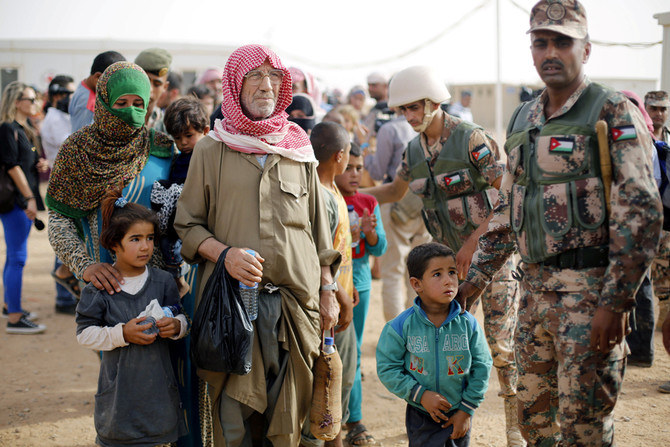
- Dmitry Medlev speaks of impact of over 3m people from neighboring areas
LONDON: Oxfam’s country director in Jordan said on Friday the global community had a responsibility to support refugees, especially in light of unrest in the Middle East.
In an interview with the Jordan News Agency, Dmitry Medlev described how an influx of over 3 million refugees from neighboring areas had stretched Jordan’s economic resources, disrupted local communities, and burdened public services.
He described the refugee’s experience as harrowing, often involving the painful process of abandoning the individual’s homeland and everything they held dear.
He said: “We are sending a message to the world not to overlook the refugee problem and to keep its focus on the new global disasters created by humans or caused by natural disasters, and the conflicts that have emerged in several countries recently, because the refugee problem is draining host countries and imposing additional burdens on them that they may not be able to bear in the future.”
Medlev called for enhanced international cooperation and adherence to international humanitarian law in supporting refugees, underscoring the need for long-term solutions to the ongoing crisis.
He also spoke of Oxfam’s initiatives in Jordan, such as the Waste to Positive Energy project in partnership with the Federal Ministry of Economic Cooperation and Development, and the EU, and executed with the German Corporation for International Cooperation. The project focuses on waste management and recycling in Zaatari Camp and Mafraq Governorate, processing about 30 tonnes of waste per day.
Medlev also pointed out Oxfam’s efforts in promoting economic and climate justice through grants aimed at empowering local projects led by women and youngsters. These grants help enhance project efficiency, ensure sustainability, and connect beneficiaries with supportive institutions.
He outlined Oxfam’s five-year strategy in Jordan, which focuses on gender justice, climate justice, and economic justice, and aims to bolster the country’s preparedness for disasters, enhance employment opportunities, and provide humanitarian support for refugees.
Jordan’s King Abdullah II told the UN General Assembly in September that the world must not abandon Palestinian refugees to the forces of despair.
Sudanese rue shattered dreams as war enters second year
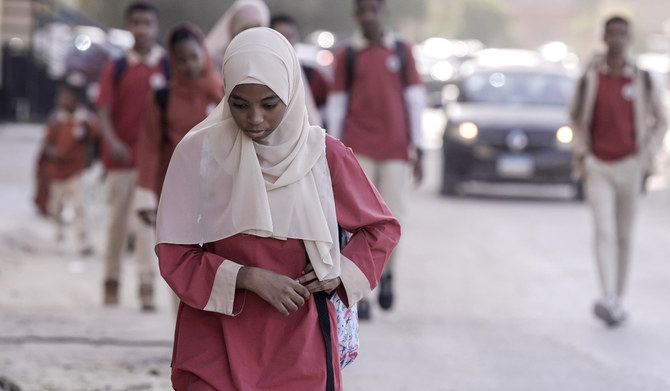
- Bashir’s ouster in April 2019 ushered in a civilian-led transition that saw an outpouring of “hope, inspiration and vibrancy” among young Sudanese, said Samah Salman, who worked in corporate venture capital then
DUBAI: Lawyer Omar Ushari still remembers the hope that gripped Khartoum after the uprising that overthrew President Omar Bashir in 2019. Now, after a year of war between rival generals, much of the Sudanese capital lies in ruins.
The 46-year-old, then detained for his activism, celebrated behind bars when Bashir was toppled in a palace coup.
In the heady days that followed, as the army promised a transition to elective civilian rule, Ushari was released and set to work on his dream project: a literary cafe near the banks of the Nile.
Named Rateena, his cafe swiftly became known as a safe haven for young activists eager to contribute to building a “better Sudan.”
But on April 15 last year, the Sudanese army and the paramilitary Rapid Support Forces went to war, and Ushari watched both his project and his dreams for the country “fade, bit by bit.”
BACKGROUND
Omar Bashir’s ouster in April 2019 ushered in a civilian-led transition that saw an outpouring of ‘hope, inspiration and vibrancy’ among young Sudanese, says Samah Salman, who worked in corporate venture capital then.
For months, he braved raging street battles to visit Rateena, “sit in the dark, take stock of what had been looted since my last visit, and reminisce.”
He did not understand how “the music that filled the space, the lectures and debates people shared, had been replaced with stray bullets strewn around me and the sound of tank fire outside.”
Now, as the war has entered its second year, with thousands dead and millions more driven from their homes, Ushari says he is “only one of the thousands of dreams shattered” — a microcosm of “a stolen revolution.”
Bashir’s ouster in April 2019 ushered in a civilian-led transition that saw an outpouring of “hope, inspiration and vibrancy” among young Sudanese, said Samah Salman, who worked in corporate venture capital then.
Startups were “springing up all across Sudan,” she said from the US, “all building extraordinary solutions to real needs ordinary Sudanese people were facing.”
Salman reviewed over 50 startups in telehealth, agritech, renewable energy, logistics, and fintech solutions, crediting the boom to “the energy of the revolution.”
According to Ushari, “hopes were high that Sudan was finally on the right path, out of the shadows and heading toward democracy, toward freedom.”
Like countless others, communications expert Raghdan Orsud, 36, wanted to play her part.
She co-founded Beam Reports to investigate disinformation in Sudan — “out of the belief in the role media can play in democratic transition,” she said from London.
But that transition ended in October 2021, two months after Beam Reports launched.
The same generals who would later go to war — army chief Gen. Abdel Fattah Al-Burhan and his then-deputy RSF commander Gen. Mohammed Hamdan Dagalo — ousted civilians from the transitional administration.
“Nothing was the same after the coup,” Ushari said.
“It was a painful time. They were killing protesters every week, but still, we had hope.”
Then, one fateful Saturday at the end of Ramadan, the people of Khartoum awoke to the sounds of air strikes and shelling as their worst fears came true: the erstwhile allies had turned their guns on each other.
Bodies began piling up on the streets as vicious urban warfare drove millions to flee.
Orsud had just bought studio-grade recording equipment, “still in their boxes,” when RSF paramilitaries seized and looted her offices.
Ushari was piecing together a life in Cairo when he received a video message showing a massive fire.
“That’s how I found out Rateena had burned down,” he said.
Countless Sudanese in the diaspora — who had spent decades saving up to build their Khartoum homes — have been forced to watch from afar as the RSF looted them.
“At some point, he was praying for an airstrike to hit the house,” pastry chef Shaimaa Adlan, 29, said in Cairo, referring to her father in Saudi Arabia.
“He would have rather seen it destroyed than know his life’s work was being used as a paramilitary base.”
Adlan had started a catering business in Khartoum before finding herself in Egypt — uprooted and jobless.
But barely a year later, she sprints through a bustling kitchen in Cairo, shouting orders to her staff and fussing over dishes.
Back home, Salman says the war has not crushed Sudanese entrepreneurialism, just redirected it.
She said tech entrepreneurs now crowdsource real-time safety updates instead of protest plans and optimize evacuation paths instead of delivery routes.
The same young people organizing demonstrations now coordinate aid, becoming what the UN calls “the front line” of humanitarian response.
And in displacement centers and the diaspora, the dream of a new Sudan has not been forgotten.
“No matter where we’ve been exiled or what remote Sudanese state we’ve ended up in, there’s still a spark of the revolution left in every heart,” Ushari said.
“Sudan is ours, it’s all of ours,” said Orsud, whose fact-checking team has resumed operations from Nairobi.
“What else would we do besides rebuild it, over and over?“





